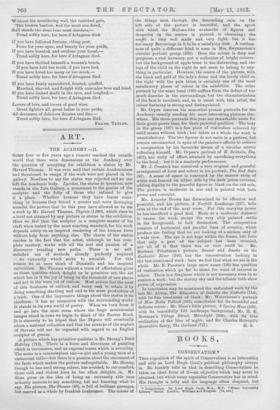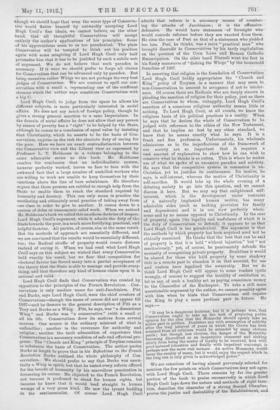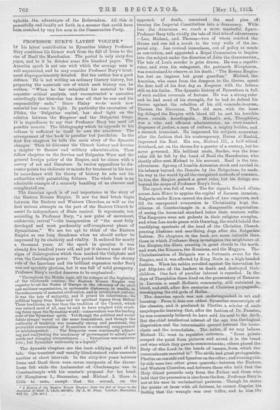BOOKS.
CONSERVATISM.* THIS exposition of the spirit of Conservatism is as interesting and able as Lord Hugh Cecil's political philosophy always is. He frankly tells us that in describing Conservatism he takes an ideal form of it—an objective which may never be attained, but which every reputable Conservative has in mind. His thought is lofty and his language often eloquent, but • Consorvation. By Lord Hugh Cecil, NA., M.P. "Home University Library " Series. Loudon ; Williams and Norgete. [is, net. j
'though we should hope that even the worst type of Conserva- tive would flatter himself by outwardly accepting Lord Hugh Ceeil'a fine ideals, we cannot believe, on the other dmnd, that all thoughtful Conservatives will accept -entirely the author's applications of his principles. Some • of his appreciations seem to us too paradoxical. The plain Conservative will be tempted to think out his• position again with some misgiving if Lord Hugh Cecil only half persuades him that it has to be justified by such a subtle web of argument. We do not believe that such paradox is necessary. If it were we should prefer to forgo all claims for Conservatism that can be advanced only by paradox. But being ourselves rather Whigs we are not perhaps the very beat judges of Conservatism. We are content to spell our con- servatism with a small c, representing one of the confluent streams which the author says constitute Conservatism with a big C.
Lord Hugh Cecil, to judge from the space he allows his (Efferent subjects, is more particularly interested in social affairs. He does not say much of foreign policy, though he :gives a strong general sanction to a sane Imperialism. In tke domain of social affairs he does not allow that any person by reason of poverty has a " right" to be helped by the State, although he comes to a conclusion of equal value by insisting that Christianity, which he asserts to be the basis of Con- servatism, enjoins on the rich the absolute duty of caring for the poor. Here we have an exact contradistinction between the Conservative view and the Liberal view as expressed by Professor L. T. Hobhouse in a volume belonging to the same admirable series as this book. Mr. Hobhouse reaches the conclusion that an individualistic system, however perfectly worked, leaves us face to face with the awkward fact that a large number of unskilled Workers who are willing to work are unable to keep themselves by their .exertions above the line of bare subsistence. He therefore argues that those persons are entitled to enough help from the titte to enable them to reach the standard required by humanity and decency. This can only mean in practice the mutilating and ultimately cruel practice of taking away from • one class in order to give to another. It comes down to a system of doles or uneconomic relief work. When we noticed Mr. Hobhouse's book we called this an odious doctrine of despair.
Lord Hugh Cecil's argument, while it admits the duty of the State towards the poor, is a much more fortifying, practical, and
helpful doctrine. All parties, of course, aim at the same result.
But the methods of approach are essentially different, and we are convinced that the results would be essentially different, too; the Radical shuffle of property would create distress instead of curing it. When we had read what Lord Hugh Cecil says on this subject we wished that every Conservative held exactly his creed, but we fear that competition for electoral favour has forced many into a partial acceptance of the theory that the State is able to manage and provide every- thing, and that therefore any kind of human claim upon it is rational and valid.
Lord Hugh Cecil finds that Conservatism was created by opposition to the principles of the French Revolution. Con- servatism is only another name for anti-Jacobinism. Pitt and Burke, says Lord Hugh Cecil, were the chief creators of 'Conservatism—though the name of course did not appear till 1837—and he demurs to the general description of Pitt as a Tory and Burke as a Whig. Pitt, he says, was "a dissentient Whig" and Burke was "a conservative" (with a small c) all his life. Conservatism drew its motives from several sources. One source is the ordinary mistrust of what is unfamiliar ; another is the reverence for authority and religion ; another the tacit admonition of experience that Conservatism is a necessary condition of safe and effectual pro- gress. The " Church and King " principle of Toryism remains in substance the basis of Conservatism. The author quotes Burke at length to prove that in his Reflections on the French .Revolution Burke outlined the whole philosophy of Con- • servatism. We should prefer to say that Burke was essen- tially a Whig in spirit, but that he tested every reform offered for the benefit of humanity by his marvellous penetration in 'foreseeing its course. He objected to the French Revolution, not because it professed to stand for human rights, but because he knew that it would lead straight to human 'wrongs of a very gross kind. He saw the tyrant budding in the sentimentalist. Of course Lord Hugh Cecil admits that reform is a necessary means of counter- ing the attacks of Jacobinism ; it is the offensive- defensive. He would have statesmen of foresight who would concede reforms before they are exacted from them.
He cites the case of Peel as that of a statesman who yielded too late. Peel, he thinks, was a mere " practical man" who brought discredit to Conservatives by his tardy capitulation on the question of the Corn Laws and Roman Catholic Emancipation. On the other hand Disraeli went too fast in his flashy manoeuvre of "dishing the Whigs" by the household franchise of 1867.
In asserting that religion is the foundation of Conservatism Lord Hugh Cecil boldly appropriates the " Church and King " policy of Toryism in a manner that may seem to non-Conservatives to amount to arrogance if not to intoler- ance. Of course there are Radicals who are deeply sincere in pleading the sanction of religion for their policy, just as there are Conservatives to whom, unhappily, Lord Hugh Cecil's assertion of a conscious religious authority means little or nothing. To Lord Hugh Cecil, at all events, we know the religious basis of his political practices is a reality. When he says that he desires the whole of Conservatism to be judged with reference to the ethics of the New Testament, and that he implies no teat by any other standard, we know that he means exactly what he says. It is a frank and fine profession. Unfortunately, his wholesale admissions as to the imperfections of the framework of our society are so important that it requires a vast amount of explanation to show how he can wish to conserve what he thinks is so rotten. This is where he makes use of what we spoke of as excessive paradox and subtlety. He says that the competitive system in commerce is un- Christian, yet he justifies its continuance. Its motive, he says, is self-interest, whereas the motive of Christianity is self-sacrifice. It would take up the whole evening of debating society to go into this question, and we cannot discuss it here. But we may say that enlightened self- interest, which is the development under restraint of a naturally implanted human motive, has many admirable sides (such as making provision for family and dependents) and is in our view perfectly whole- some and by no means opposed to Christianity. In the case of property, again (the legality and usefulness of which it is the duty of Conservatism to defend), it appears to us that Lord Hugh Cecil is too paradoxical. His argument is that
the methods by which property has been acquired need not be ethically examined. He thinks that the hest that can be said of property is that it is held "without injustice," but " not meritoriously," yet, of course, he passionately defends the necessity of recognizing private property. Doubtless it would be absurd for those who hold property by some shadowy title in a remote past to abandon it on that account, for use and custom have legalized the ownership. But we do think Lord Hugh Cecil will appear to some readers (quite wrongly, of course) to suggest the inutility of restitution or, let us say, of such a healthy act as paying conscience money
to the Chancellor of the Exchequer. To take a still more questionable argument by the author, we cannot possibly agree with him when he hints that Conservatism will require the King to play a more partisan part in future. He says :—
"It may be a dangerous doctrine, but it is perhaps true, that Conservatism ought to take up the task of preparing public opinion for the idea that the Monarchy should openly take an active part in politics. Doubtless any such assumption of activity after the long interval of years in which the Crown has been screened from all criticism would be attended by many obvious perils ; but though less obvious, the danger of the Monarchy becoming discredited as an inoperative ornament and sinking slowly from being the centre of loyalty to be received, first with good-natured toleration and finally with impatient contempt, is perhaps now the more real menace. An active Monarchy would incur the enmity of many, but it would enjoy the respect which in the long run is only given to acknowledged power."
We are conscious of having almost perversely selected for mention the few points on which Conservatives may not agree with Lord Hugh Cecil. There remains by far the greater portion of the book to praise unreservedly in which Lord Hugh Cecil lays down the nature and methods of right taxa- tion, describes the character of a strong Second Chamber, proves the justice and desirability of the Establishment., and upholds the advantages of the Referendum. All this is powerfully and lucidly set forth in a manner that could have been matched by very few men in the Conservative Party.












































 Previous page
Previous page